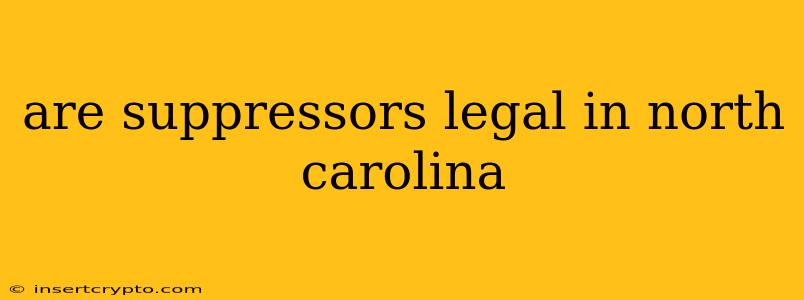The legality of firearm suppressors, often called silencers, in North Carolina is a complex issue, subject to both federal and state regulations. This guide will clarify the current laws and help you understand the process of legally owning a suppressor in the state.
North Carolina Suppressor Laws: The Basics
North Carolina law allows for the possession and use of firearm suppressors, but with significant restrictions and requirements. It's crucial to understand that federal law also plays a significant role, and compliance with both is mandatory.
Key Aspects of North Carolina Suppressor Law:
- Registration: North Carolina requires the registration of firearm suppressors with the North Carolina State Bureau of Investigation (SBI). This is a separate registration from federal registration, which is also required under the National Firearms Act (NFA).
- Purchase Process: The purchase process is lengthy and involves a background check, fingerprinting, and the submission of the necessary paperwork to both the ATF (federal) and the SBI (state).
- Permitted Uses: While legal, suppressors are typically restricted to hunting and sport shooting, with specific limitations potentially imposed by local ordinances. Their use in self-defense or other scenarios may face additional scrutiny.
Federal Regulations: The National Firearms Act (NFA)
The NFA governs the manufacture, transfer, and possession of suppressors across the United States. Key aspects of the NFA concerning suppressors include:
- Tax Stamp: A significant tax stamp is required for each suppressor you purchase. This involves completing ATF Form 4 and undergoing a thorough background check. The process can take several months.
- Background Check: The background check is rigorous and includes a review of your criminal history, mental health records, and more.
- Storage and Transportation: Strict regulations govern the storage and transportation of NFA items, including suppressors. Improper handling can lead to significant legal penalties.
Obtaining a Suppressor in North Carolina: A Step-by-Step Guide
Acquiring a suppressor legally in North Carolina involves multiple steps, encompassing both state and federal requirements. These steps generally include:
- Find a Licensed Dealer: Locate a licensed dealer who is familiar with NFA regulations and North Carolina's specific requirements. This is crucial for navigating the complex paperwork and processes.
- Complete ATF Form 4: This federal form initiates the ATF's approval process. Accuracy is paramount, as errors can significantly delay or even jeopardize the application.
- Pay the Tax Stamp: The substantial tax stamp is a non-refundable fee required for the approval of the ATF Form 4.
- Undergo Fingerprinting: You'll need to undergo fingerprinting at a designated location, with the prints submitted as part of the application.
- Complete SBI Registration: Once the ATF approves your Form 4, you'll need to register your suppressor with the North Carolina SBI. This involves additional paperwork and may entail additional fees.
- Await Approval: The entire process can take several months, even a year or more, depending on the workload of the ATF and SBI.
Penalties for Non-Compliance
Failure to comply with either federal or state laws concerning suppressors can result in significant penalties, including hefty fines and potential imprisonment. It is essential to meticulously follow all procedures and ensure complete accuracy in all documentation.
Conclusion: Understanding the Legal Landscape
Owning a suppressor in North Carolina is possible, but it's a process demanding patience, precision, and strict adherence to both federal and state laws. Understanding the complexities of the NFA and North Carolina's specific regulations is paramount. Always consult with a qualified legal professional and a licensed firearms dealer experienced with NFA items to ensure full compliance with all applicable laws. This information is for educational purposes only and should not be considered legal advice. Always consult with relevant authorities for the most up-to-date and accurate information.

